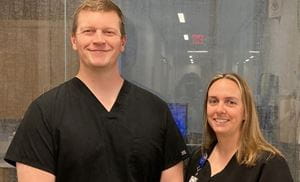
CANTON, NY – With the COVID pandemic out of the limelight, many people are not giving a second thought as to how an Infectious Diseases (ID) specialist may be able to assist them with their healthcare. The ID team with St. Lawrence Health (SLH) has office hours at its Medical Campus at 6119 US Route 11 in Canton, and are regularly seen tending to patients at Canton-Potsdam Hospital.
Daniel Soule, DO; and Jamie Gibson, FNP-C, are the two main providers in the ID team. They have expertise in anti-infectives, with a foundation in Internal Medicine. They are sometimes asked by colleagues to provide their skills by working up a patient's symptoms and using a “detective” approach in discovering the patient’s ailment.
“Infectious Diseases is a specialty in medicine that does not necessarily focus on an organ system and its pathology, like cardiology and the heart, or pulmonology with the lung, but instead focuses on outside factors that can impact an organ system’s function,” Dr. Soule said. “This allows us to encounter pathology across all different organ systems, across a wide range of ages. Often, if we can identify an infection, there may be a cure or treatment that will help our patients feel better after only a short period of time.
“Our focus is on the patient and their interaction with the world at large. We try to determine the cause of their symptoms, which often leads to some unusual questions, and even better answers,” he laughed. “This field is never boring and can sometimes help put the big picture into a condensed snapshot for our patients.”
When to See an ID Specialist
Some common health concerns patients turn to Dr. Soule and Ms. Gibson for include:
“We see a wide array of issues; sometimes they are not infectious, but we need to rule that out,” Dr. Soule noted. “We often get consulted for uncommon or common infections that present uncommonly. Our approach is typically more investigative and can sometimes include seemingly bizarre or unexpected questions related to possible exposure risks for infections.”
Sexually transmitted infections (STIs) are diagnosed on a regular basis, and while HIV is no longer a front page news article, it is still a global and local health concern, and can affect any person, regardless of age, gender, or sexual orientation. With the four colleges in our area, Ms. Gibson finds herself educating patients on a regular basis about STIs, viral hepatitis, and HIV.
“People are no longer dying from HIV, and now it can be prevented altogether,” she said. “PREP, or pre exposure prophylaxis for HIV, is very effective at preventing acquisition of HIV. It will not, however, prevent other sexually transmitted infections. Condom use is still recommended for patients on PREP.”
PREP can benefit the community by decreasing the transmission of HIV. Furthermore, part of PREP management is as-needed screening for non-HIV sexually transmitted infections (STIs), as well as routine quarterly screening for other STIs.
“Fostering open discussions with our patients about their concerns related to sexual health assists in addressing the spread of non-HIV STIs in our communities,” Ms. Gibson said.
Receiving Treatment
Most patients seeking care from an Infectious Diseases provider will need a referral. However, a referral is not required for patients seeking HIV management, pre-exposure prophylaxis for HIV, or sexually transmitted infection testing/treatment.
“If you do see us as a patient, the first visit is usually the longest when we collect a detailed history of symptoms, exposures, and prior workups/treatments,” Dr. Soule noted. “We may not identify an infection or causative agent, but we can usually help narrow down the possible diagnosis. Follow-up visits are typically shorter once the patient’s history has been obtained and discussed.”
Learn more about St. Lawrence Health.